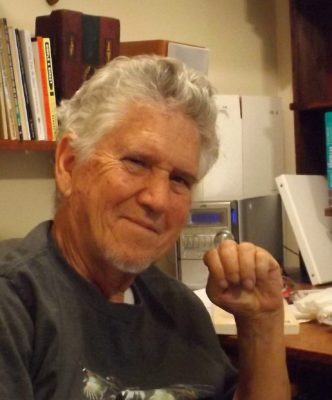
When my daughter was about twelve, she made a profound observation. I was struggling to write a report—couldn’t seem to get the words right, had filled several notebook pages with scratched-out words.
“Writing is easy,” my daughter said. “You just put one word after another.”
“Not that simple. It has to be the right word.”
“But that’s not writing. That’s creating. Different thing altogether. Writing is making a grocery list. Anyone can do that.”
I’m not sure she realized how profound an observation that was. Most of us are trying to create something. Putting words together in a way that creates in the mind of the reader something that wasn’t there before. Something that will linger, alter, bend, leave the reader a different person.
That is what good writing does, and it is putting one word after another.
It’s just that easy,
and it’s just that hard.
And magical.

The only thing we use is black marks on white paper. How is it that something so simple can, in skilled hands, have so profound an effect? What is happening between the mind that made those marks and the mind that reads them? Minds—separated by centuries, culture, life experiences—somehow interact based only on those black marks. What wondrous magic happens to the reader when Odysseus finally reaches home and only his dog recognizes him? How is it that Homer’s “pen” is mightier than his hero’s sword?
If we only knew. If some bottle sitting on our desk contained that magic, we would open and pour. But there is no bottle. Mark Twain was right. Genius is 98% perspiration, piles of discarded paper, hours spent staring at white space. There is no magic in creating great literature.
The magic happens to the reader.


Skipper Hammond
Wish a magic wand would fall from the sky onto my desk.
Joan H. Carter
Mike, you’ve zeroed in on a tremendously important concept, that as writers telling our stories we are trying to create images and ideas in the mind of a reader. Carefully chosen added detail can enhance the communication. A glitch in the transmission—an omitted transition, wordiness, a tangled timeline, or even just a missing or misplaced comma—interferes to some degree. Writing stories is a craft, a challenging art form.
Ann~Marie Magné
Great piece, Mike.
Susie H. Baxter
Your words are so right! It is just that easy and just that hard.
M. L. Kite
Thankx all. I’ve always liked that Gailman quote. One word after another so easy. But WHICH word???
Marie Q Rogers
Beautifully said–almost poetry!
M. L. Kite
Thank you. Very nice of you.